Роды, жанры и виды литературы.pptx
- Количество слайдов: 13
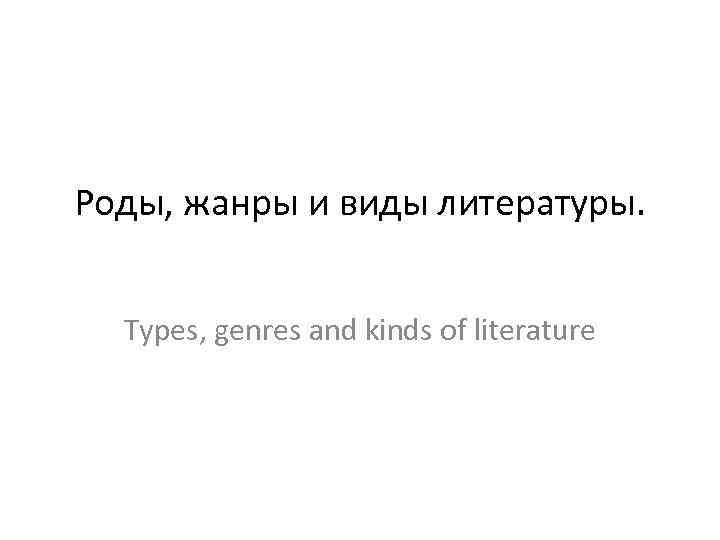 Роды, жанры и виды литературы. Types, genres and kinds of literature
Роды, жанры и виды литературы. Types, genres and kinds of literature
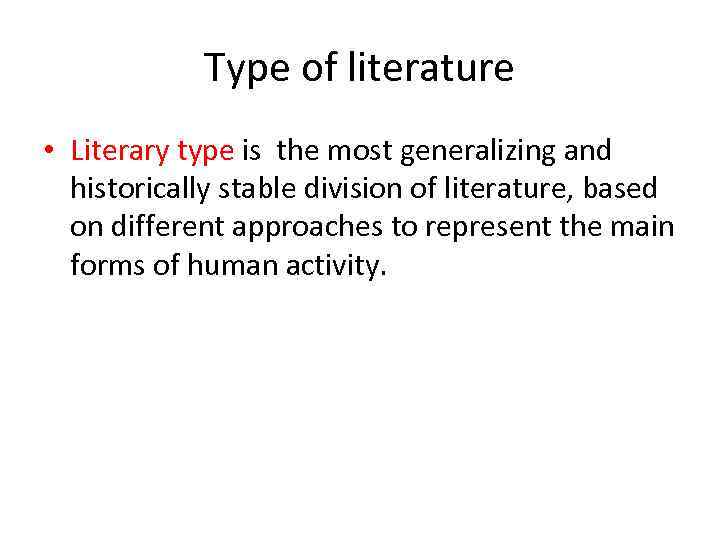 Type of literature • Literary type is the most generalizing and historically stable division of literature, based on different approaches to represent the main forms of human activity.
Type of literature • Literary type is the most generalizing and historically stable division of literature, based on different approaches to represent the main forms of human activity.
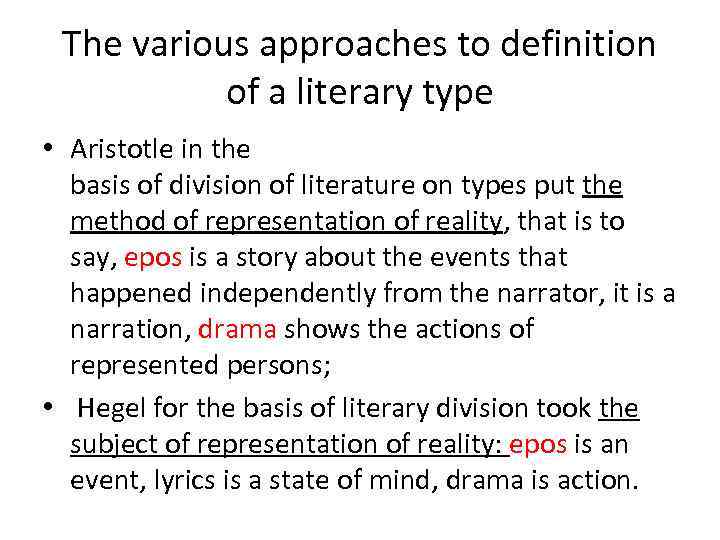 The various approaches to definition of a literary type • Aristotle in the basis of division of literature on types put the method of representation of reality, that is to say, epos is a story about the events that happened independently from the narrator, it is a narration, drama shows the actions of represented persons; • Hegel for the basis of literary division took the subject of representation of reality: epos is an event, lyrics is a state of mind, drama is action.
The various approaches to definition of a literary type • Aristotle in the basis of division of literature on types put the method of representation of reality, that is to say, epos is a story about the events that happened independently from the narrator, it is a narration, drama shows the actions of represented persons; • Hegel for the basis of literary division took the subject of representation of reality: epos is an event, lyrics is a state of mind, drama is action.
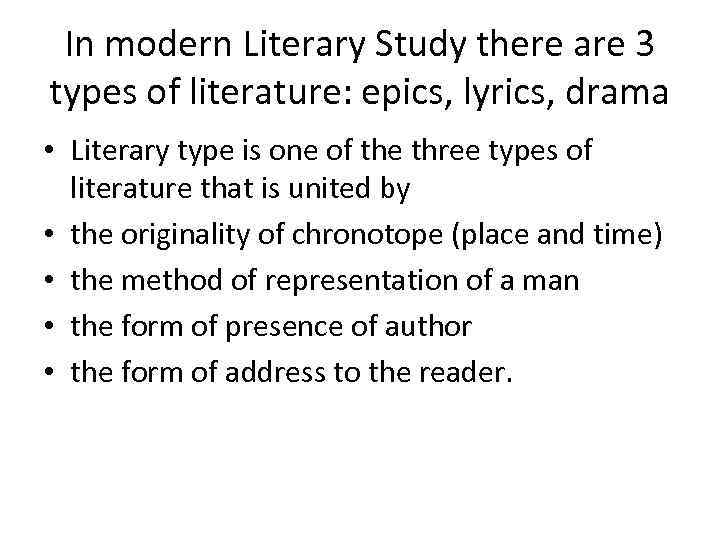 In modern Literary Study there are 3 types of literature: epics, lyrics, drama • Literary type is one of the three types of literature that is united by • the originality of chronotope (place and time) • the method of representation of a man • the form of presence of author • the form of address to the reader.
In modern Literary Study there are 3 types of literature: epics, lyrics, drama • Literary type is one of the three types of literature that is united by • the originality of chronotope (place and time) • the method of representation of a man • the form of presence of author • the form of address to the reader.
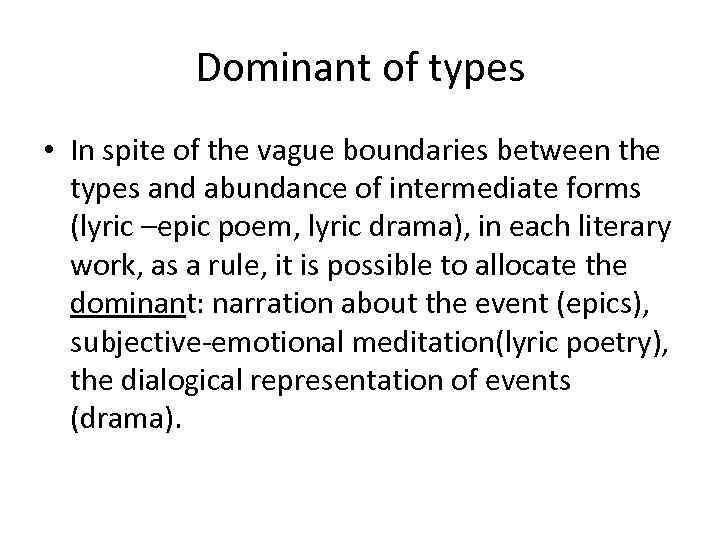 Dominant of types • In spite of the vague boundaries between the types and abundance of intermediate forms (lyric –epic poem, lyric drama), in each literary work, as a rule, it is possible to allocate the dominant: narration about the event (epics), subjective-emotional meditation(lyric poetry), the dialogical representation of events (drama).
Dominant of types • In spite of the vague boundaries between the types and abundance of intermediate forms (lyric –epic poem, lyric drama), in each literary work, as a rule, it is possible to allocate the dominant: narration about the event (epics), subjective-emotional meditation(lyric poetry), the dialogical representation of events (drama).
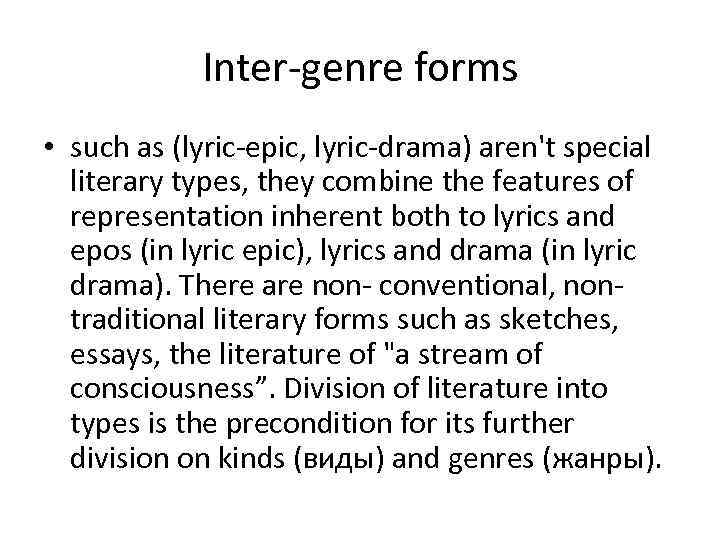 Inter-genre forms • such as (lyric-epic, lyric-drama) aren't special literary types, they combine the features of representation inherent both to lyrics and epos (in lyric epic), lyrics and drama (in lyric drama). There are non- conventional, non- traditional literary forms such as sketches, essays, the literature of "a stream of consciousness”. Division of literature into types is the precondition for its further division on kinds (виды) and genres (жанры).
Inter-genre forms • such as (lyric-epic, lyric-drama) aren't special literary types, they combine the features of representation inherent both to lyrics and epos (in lyric epic), lyrics and drama (in lyric drama). There are non- conventional, non- traditional literary forms such as sketches, essays, the literature of "a stream of consciousness”. Division of literature into types is the precondition for its further division on kinds (виды) and genres (жанры).
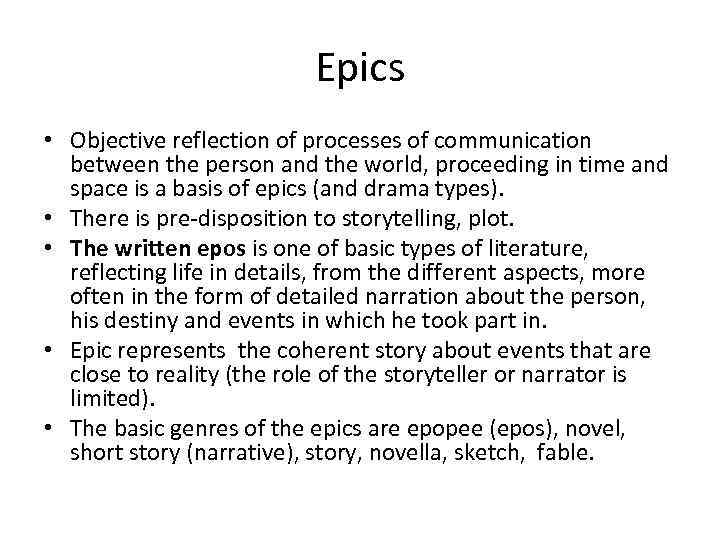 Epics • Objective reflection of processes of communication between the person and the world, proceeding in time and space is a basis of epics (and drama types). • There is pre-disposition to storytelling, plot. • The written epos is one of basic types of literature, reflecting life in details, from the different aspects, more often in the form of detailed narration about the person, his destiny and events in which he took part in. • Epic represents the coherent story about events that are close to reality (the role of the storyteller or narrator is limited). • The basic genres of the epics are epopee (epos), novel, short story (narrative), story, novella, sketch, fable.
Epics • Objective reflection of processes of communication between the person and the world, proceeding in time and space is a basis of epics (and drama types). • There is pre-disposition to storytelling, plot. • The written epos is one of basic types of literature, reflecting life in details, from the different aspects, more often in the form of detailed narration about the person, his destiny and events in which he took part in. • Epic represents the coherent story about events that are close to reality (the role of the storyteller or narrator is limited). • The basic genres of the epics are epopee (epos), novel, short story (narrative), story, novella, sketch, fable.
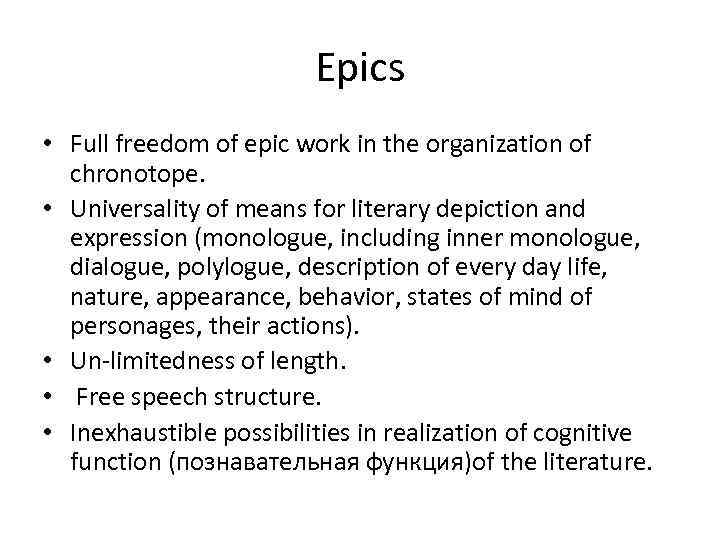 Epics • Full freedom of epic work in the organization of chronotope. • Universality of means for literary depiction and expression (monologue, including inner monologue, dialogue, polylogue, description of every day life, nature, appearance, behavior, states of mind of personages, their actions). • Un-limitedness of length. • Free speech structure. • Inexhaustible possibilities in realization of cognitive function (познавательная функция)of the literature.
Epics • Full freedom of epic work in the organization of chronotope. • Universality of means for literary depiction and expression (monologue, including inner monologue, dialogue, polylogue, description of every day life, nature, appearance, behavior, states of mind of personages, their actions). • Un-limitedness of length. • Free speech structure. • Inexhaustible possibilities in realization of cognitive function (познавательная функция)of the literature.
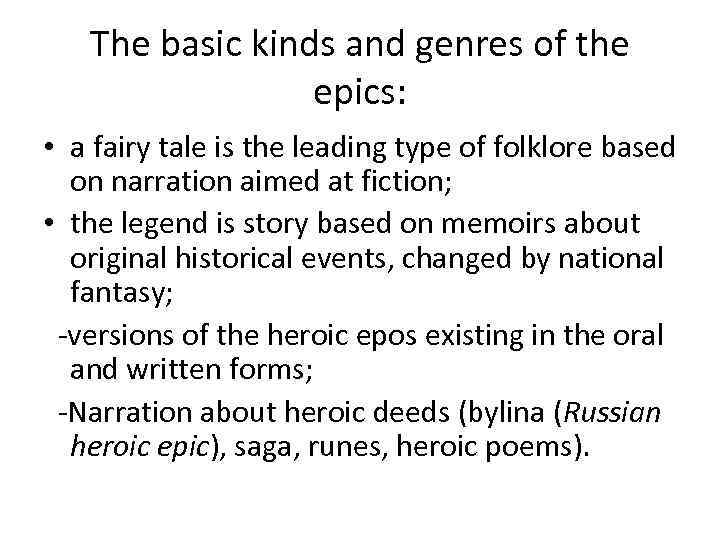 The basic kinds and genres of the epics: • a fairy tale is the leading type of folklore based on narration aimed at fiction; • the legend is story based on memoirs about original historical events, changed by national fantasy; -versions of the heroic epos existing in the oral and written forms; -Narration about heroic deeds (bylina (Russian heroic epic), saga, runes, heroic poems).
The basic kinds and genres of the epics: • a fairy tale is the leading type of folklore based on narration aimed at fiction; • the legend is story based on memoirs about original historical events, changed by national fantasy; -versions of the heroic epos existing in the oral and written forms; -Narration about heroic deeds (bylina (Russian heroic epic), saga, runes, heroic poems).
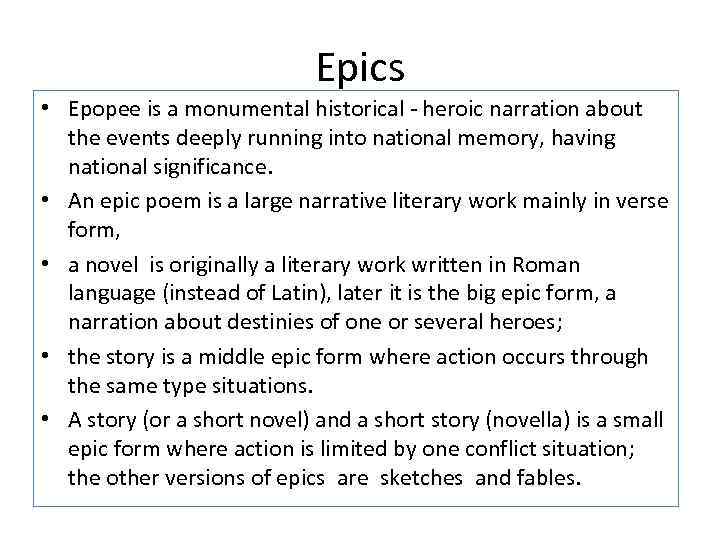 Epics • Epopee is a monumental historical - heroic narration about the events deeply running into national memory, having national significance. • An epic poem is a large narrative literary work mainly in verse form, • a novel is originally a literary work written in Roman language (instead of Latin), later it is the big epic form, a narration about destinies of one or several heroes; • the story is a middle epic form where action occurs through the same type situations. • A story (or a short novel) and a short story (novella) is a small epic form where action is limited by one conflict situation; the other versions of epics are sketches and fables.
Epics • Epopee is a monumental historical - heroic narration about the events deeply running into national memory, having national significance. • An epic poem is a large narrative literary work mainly in verse form, • a novel is originally a literary work written in Roman language (instead of Latin), later it is the big epic form, a narration about destinies of one or several heroes; • the story is a middle epic form where action occurs through the same type situations. • A story (or a short novel) and a short story (novella) is a small epic form where action is limited by one conflict situation; the other versions of epics are sketches and fables.
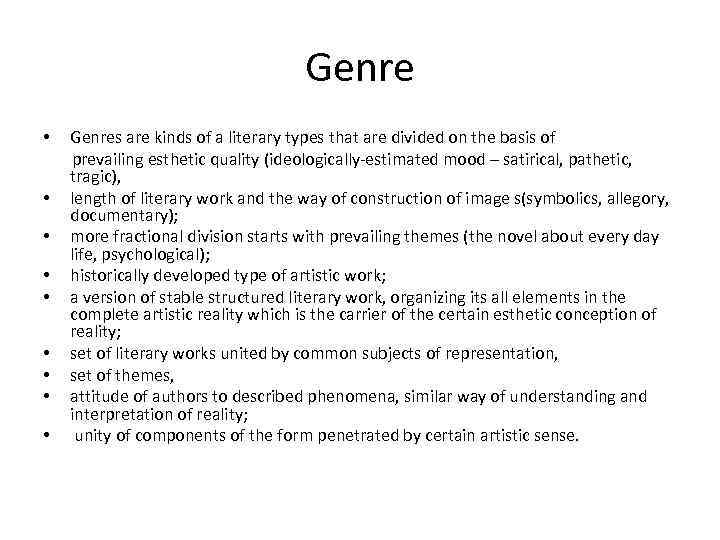 Genre • Genres are kinds of a literary types that are divided on the basis of prevailing esthetic quality (ideologically-estimated mood – satirical, pathetic, tragic), • length of literary work and the way of construction of image s(symbolics, allegory, documentary); • more fractional division starts with prevailing themes (the novel about every day life, psychological); • historically developed type of artistic work; • a version of stable structured literary work, organizing its all elements in the complete artistic reality which is the carrier of the certain esthetic conception of reality; • set of literary works united by common subjects of representation, • set of themes, • attitude of authors to described phenomena, similar way of understanding and interpretation of reality; • unity of components of the form penetrated by certain artistic sense.
Genre • Genres are kinds of a literary types that are divided on the basis of prevailing esthetic quality (ideologically-estimated mood – satirical, pathetic, tragic), • length of literary work and the way of construction of image s(symbolics, allegory, documentary); • more fractional division starts with prevailing themes (the novel about every day life, psychological); • historically developed type of artistic work; • a version of stable structured literary work, organizing its all elements in the complete artistic reality which is the carrier of the certain esthetic conception of reality; • set of literary works united by common subjects of representation, • set of themes, • attitude of authors to described phenomena, similar way of understanding and interpretation of reality; • unity of components of the form penetrated by certain artistic sense.
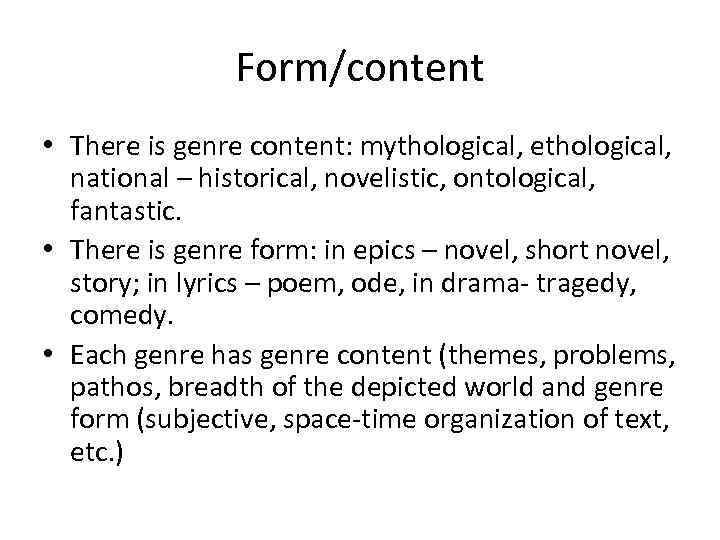 Form/content • There is genre content: mythological, ethological, national – historical, novelistic, ontological, fantastic. • There is genre form: in epics – novel, short novel, story; in lyrics – poem, ode, in drama- tragedy, comedy. • Each genre has genre content (themes, problems, pathos, breadth of the depicted world and genre form (subjective, space-time organization of text, etc. )
Form/content • There is genre content: mythological, ethological, national – historical, novelistic, ontological, fantastic. • There is genre form: in epics – novel, short novel, story; in lyrics – poem, ode, in drama- tragedy, comedy. • Each genre has genre content (themes, problems, pathos, breadth of the depicted world and genre form (subjective, space-time organization of text, etc. )
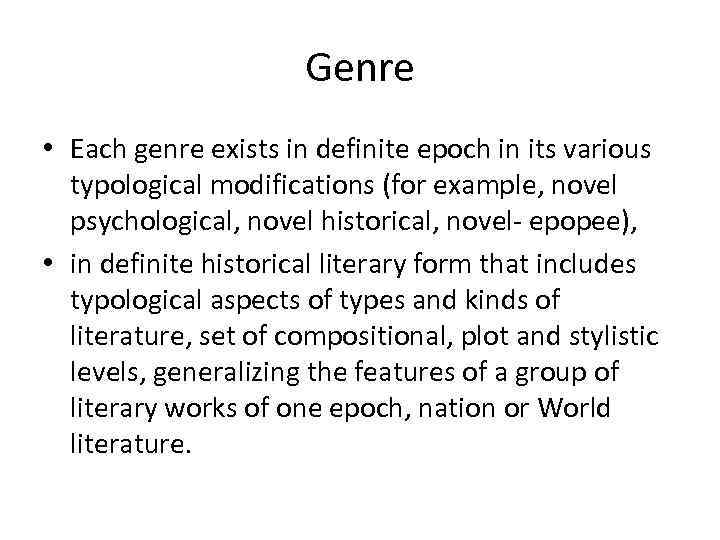 Genre • Each genre exists in definite epoch in its various typological modifications (for example, novel psychological, novel historical, novel- epopee), • in definite historical literary form that includes typological aspects of types and kinds of literature, set of compositional, plot and stylistic levels, generalizing the features of a group of literary works of one epoch, nation or World literature.
Genre • Each genre exists in definite epoch in its various typological modifications (for example, novel psychological, novel historical, novel- epopee), • in definite historical literary form that includes typological aspects of types and kinds of literature, set of compositional, plot and stylistic levels, generalizing the features of a group of literary works of one epoch, nation or World literature.


